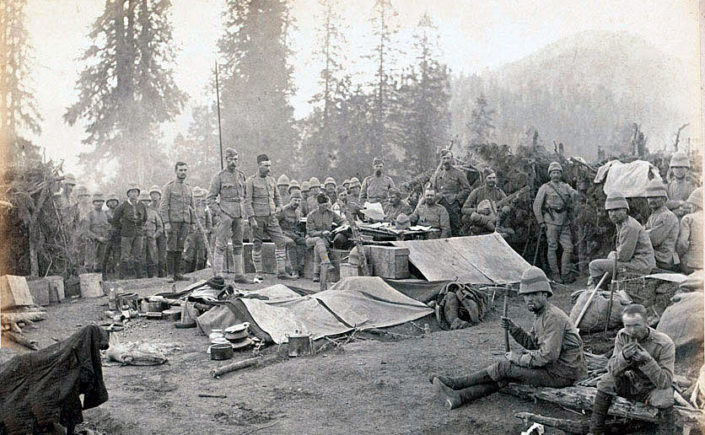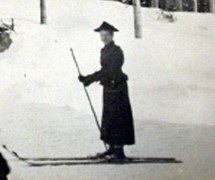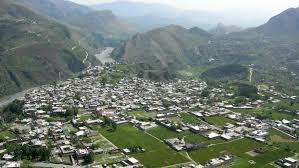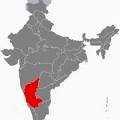
Kemball’s birthplace – Belgaum, Karnatake Province
Arnold Kemball was born in 1861 in Belgaum, India, 500 km south of Mumbai (Bombay to the English), where his father was stationed as part of the military force maintained as a counter to the nearby Portuguese colony of Goa. Like his older brother, he was sent to England at an early age to be educated as a gentleman at Wellington College.
Always destined by family tradition for a career in the army, the Kemball brothers completed their education at officer training schools, George, the elder by three years, at the Royal Military Academy, Woolwich, leading to a commission in the Royal Artillery, and Arnold at the Royal Military College, Sandhurst, which trained officers for the infantry, cavalry and the Residency armies of British India.
George Kemball’s military career was a model of steady advancement. Beginning with the Second Afghan War in 1878, he participated in several campaigns in the North West Frontier before receiving command of the West African Frontier Force in Nigeria (1901) and the Kano-Sokoto Expedition in 1903. For the next eleven years he served at the War Office in London and during the First World War he commanded Indian troops in various campaigns in the Middle East against the Ottoman Empire. He was knighted in 1917 and retired in 1919.
For the first twenty years, Arnold’s career kept pace with his brother’s. In 1880 he joined the First Battalion of the Royal Scots, the oldest infantry regiment in the British Army and served for two years in Malta. When it was assigned to the West Indies, he was able to fulfill his ambition to serve in India and transferred first to the Baluch Regiment of the Bombay Residency Army and then to the 5th Gurkha Rifles of the British Indian Army**. From 1888 to 1898 he, like his brother, was involved in several campaigns along the North West Frontier.
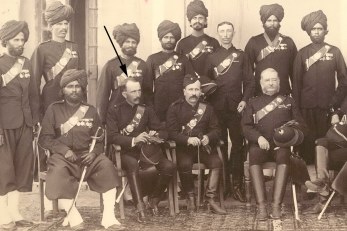
Kemball with the Baloch Regiment of the British Indian Army – 1885 – prior to transferring to the 5th Gurkhas
As a relatively junior officer, Kemball served in the Black Mountain and Hazara Expeditions (1888-91). These were punitive campaigns which took place in what is now Pakistan in retaliation for raids by Pathan tribesmen into British held territory.
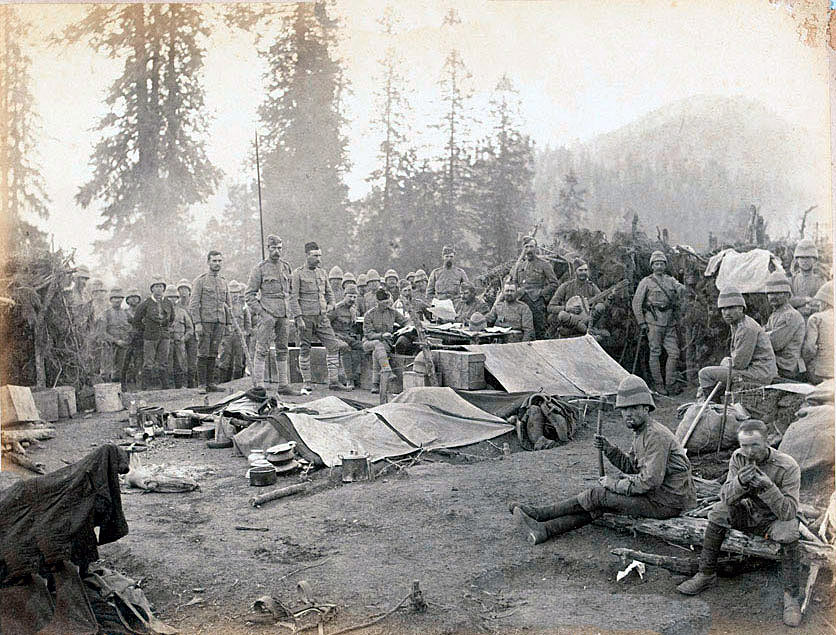
British Soldiers Black Mountain Expedition – 1888 North West Frontier
In 1893, while on leave in England, Kemball went on a winter holiday to Norway and became snowed in at a ski lodge. Also trapped with him was an eighteen year old Norwegian girl, Alvilda “Vivi” Sundt and her mother. By the end of their ten day confinement, they had fallen in love. Two years later, Kemball returned to England once more and they were married. According to the announcement in The London Standard, the ceremony was celebrated at St. Mary’s Church, Stansted, Kent, the home parish of the Kemball family. The bride was described as “the second daughter of the late Fredrik Christian Dreier Sundt of Christiania” (now Oslo, Norway). After a brief honeymoon, the Kemballs travelled to India where Arnold introduced his young wife to the life of a mem’sahib on the frontier.
They took up residence in Abbottabad*** which was the British military headquarters for the Peshawar region and home to the Gurkha regiments. There, Alvilda gave birth to two daughters, Dorothy Mary (1896) and Gerda Cecelia (1899).
In 1897 the North West Frontier was again set ablaze when the Afridi tribesmen, who had been paid by the British to guard the nearby Khyber Pass, suddenly rebelled and occupied all the forts along the India-Afghanistan border. The subsequent Tirah Expedition was one of the most difficult colonial campaigns experienced by the British Indian Army. Arnold, then Captain Kemball, was mentioned in despatches for his role in the fighting and was soon promoted to Major.
In 1905, Kemball was promoted to Lieutenant Colonel and given command of a battalion of the 5th Gurkha Rifles. Two years later he was appointed Colonel of the entire regiment. In 1912, after his retirement, he was made a Companion of the Order of the Bath (CE) in recognition of his service in India.
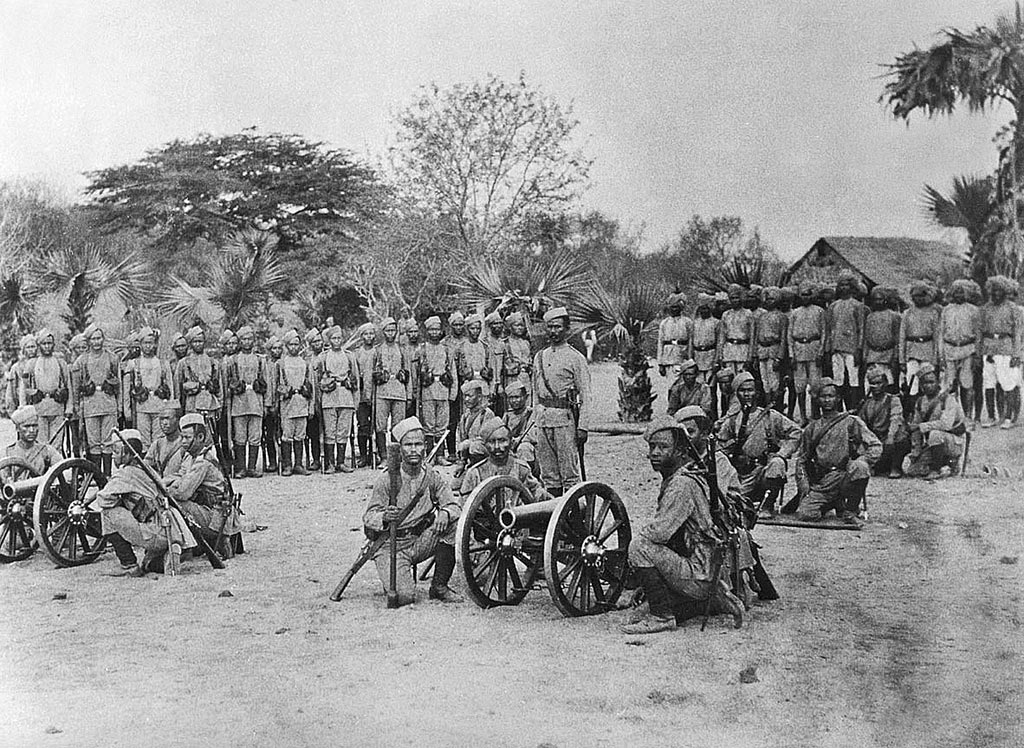
Gurkha Rifles seven pound artillery unit
Before taking up this final command, the Kemballs returned to England and installed their daughters, now eleven and eight years old, at Belstead House School in Suffolk. The school had been established for military families serving in India and the girls remained there for the next three years.
**Gurkhas were tribesmen from Nepal who fought against the British with such success that they were later recruited into the Raj armies and became synonymous with courage and military prowess. “If a man says he is not afraid of dying he is either a liar or a Gurkha.”
***Abbottabad was named after its founder (1853) Major James Abbott and because of its pleasant and relatively moderate climate, is a popular tourist destination today. It should be noted however, that its militant history continues. In January 2011, terrorist Umar Patek, responsible for the deadly Bali Bombings was arrested there. Later in the same year, Osama bin Laden was found and killed in the city.
